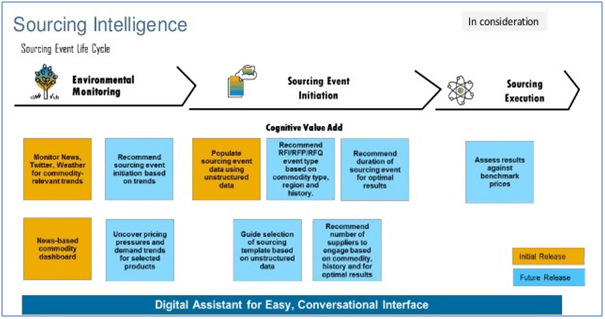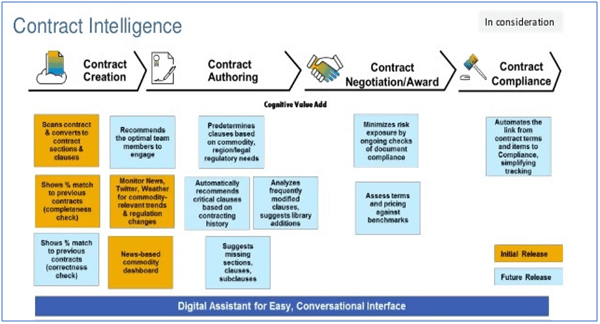Data analytics is the process of examining data sets in order to draw conclusions about the information they contain, increasingly with the aid of specialized systems and software. Data analytics technologies and techniques are widely used in commercial industries to enable organizations to make more-informed business decisions.
Artificial Intelligence (AI) is where we first heard the term cognitive technology. Technology experts began seeing the benefits of AI among consumer and business application. Amazon’s Alexa and chatbots are two that come to mind that is now ubiquitous in homes and businesses. Procurement is a prime candidate to reap the benefits of what AI has to offer because it is data rich and transaction-heavy. Thus, any system that seeks to help procurement professionals find better information faster can only speed up decision making and ultimately drive better ROI.
Table of Contents
The Process of Cognitive Procurement
Cognitive procurement is a method of using disruptive technologies to aid in the management of the procurement function. It is the process of using self-learning technology to process data in order to aid in the process of acquiring or buying goods and services. The rise of AI and smart technologies also serves as the precursor to a paradigm-shifting approach to procurement, termed as cognitive procurement.
But cognitive procurement is much more than data and AI. It is the sum of many parts of a business ecosystem that integrate to produce synergies, like data fusion, agile analytics, and actionable intelligence.
These include:
1. Process Automation
Automated technologies drive process workflows from point to point, particularly on integrated solution suites, and allow end users to seamlessly interface across a spectrum of connected applications using common data, inputs, and outputs.
2. Big Data for Procurement
Big Data for procurement fuels this drive. Spend, sourcing, contract, supplier, and risk information pour into the typical mid to large enterprise today and, with the rise of connected devices (the so-called “Internet of Things”), this flow will continue unabated.
3. Master Data Management (MDM)
There is enormous raw potential in Big Data for Procurement, but for it to be optimized, it must be managed, analyzed, and disseminated. Like supplier information management and ERP systems, MDM is essential for corralling all the data flowing into the enterprise and categorizing, cleansing, and enriching it for further use.
4. Advanced Analytics and Algorithms
Cognitive procurement relies on the analysis of procurement data using advanced data analytics engines that leverage equally advanced algorithms to crunch numbers, identify trends, and produce predictive outputs.
5. Machine Learning
After several transactions, algorithms can begin to “learn” user patterns, and be able to adapt to user preferences for user interfacing (UI). Pretty soon, cognitive technologies will be able to “mold” itself to the user experience (UX) and serve as a “sidekick” or personal assistant to the end user.
6. Artificial Intelligence (AI)
AI takes the lessons learned from Big Data and UI and begins to “serve” the user both actively and passively – actively by leveraging predictive analytics to provide the user with push notifications and options, and passively, by receiving commands from the user to conduct a certain transaction.
7. Natural Language Processing (NLP)
Apple’s Siri and Amazon’s Echo are modern incarnations of NLP, which was developed back in 1950 by Alan Touring. Since then, it has really come of age, as it now allows users to speak or type commands to a computer, which then interprets the command and “salutes and executes”. It allows for seamless conversation between the user and the computer.
Intelligent Sourcing for Cognitive Procurement
Cognitive technologies can help with sourcing by continuously re-evaluating suppliers in order to achieve the greatest efficiency and value with the least amount of waste. Intelligent sourcing could help you identify suppliers whose product capabilities best align with customer preferences; analyze spend; and eliminate under-performing suppliers without time-consuming research and manual data aggregation.

Intelligent Contracts for Cognitive Procurement
Cognitive technologies can also streamline contracting functions. By employing a cognitive system, you can essentially shorten contract negotiation cycles and reduce costs by teaching systems to target ideal price points based on expected volume and contractual discounts.
Cognitive technologies like blockchain are eliminating the need for third-party services to process transactions, giving both companies and suppliers quicker settlement. Data can move freely and transparently, it streamlines and speeds up the transactions.

Challenges and Risks of Cognitive Procurement
To realize the greatest opportunities in the evolving AI and data analytics procurement marketplace, leaders must evaluate the following factors:
• Analytic Integration
AI quickly moving toward the ability to independently make decisions raises concerns over control, accountability, and trust. If AI procurement begins guiding controversial management decisions, then it will be important to understand exactly how and to what extent spend data should inform executive decision making to demonstrate critical thinking and have the final say.
The full content is only visible to SIPMM members
Already a member? Please Login to continue reading.
References
Andrew Bartolini, Chief Research Officer. (2018). “ The Cognitive Procurement”. Retrieved from https://ardentpartners.com/2017/03/the-cognitive-procurement-“ecosystem”, accessed 19/03/2019.
IBM Cognitive Procurement Masterclass SAP Ariba Live. (2017). “Cognitive Computing will impact every decision in 5 year”. Retrieved from https://www.slideshare.net/Ariba/cognitive-procurement-masterclass-with-ibm-sid-51774, accessed 19/03/2019.
Jaggaei. (2018). “Cognitive Procurement – Is It the Final Frontier?”. Retrieved from https://www.jaggaer.com/cognitive-procurement-is-it-the-final-frontier, accessed 19/03/2019.
Margaret Rouse. (2019). “Data analytics (DA)”. Retrieved from https://searchdatamanagement.techtarget.com/definition/data-analytics, accessed 19/03/2019.
Nillian Low, ADPSM. (2019). “Integrated AI with IOT for an Effective Supply Chain”. Retrieved from SIPMM: https://publication.sipmm.edu.sg/integrating-ai-iot-effective-supply-chain, accessed 19/03/2019.
Nurazyyati Jaffar, ADPSM. (2018). “The Future of Procurement with Artificial Intelligence”. Retrieved from SIPMM: https://publication.sipmm.edu.sg/future-procurement-artificial-intelligence ,accessed 19/03/2019.

